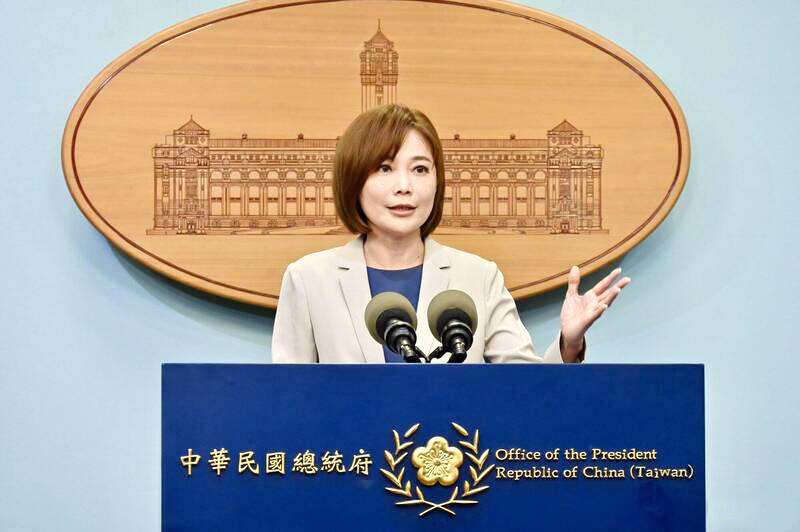Claims that President William Lai (賴清德) met with business leaders to help resolve tariff issues are false, Presidential Office spokeswoman Karen Kuo (郭雅慧) said yesterday, adding that the government maintains close communication with the US and is steadily working toward bilateral economic cooperation.
The Chinese-language Mirror Media magazone reported that Lai had repeatedly invited top business leaders in Taiwan for secret talks since US President Donald Trump announced “reciprocal” tariffs in April.
Lai hoped that the businesses would form a group to invest in the US in a bid to win a reduced US tariff rate, the report said.

Photo: George Tsorng, Taipei Times
The American Institute in Taiwan (AIT) rejected the plan and said “no official assistance from Taiwan is needed,” Mirror Media reported.
The situation described in the report is completely false, Kuo said, calling on the media to fact-check stories before they are published.
The government maintains close communications with the US in many fields, and continues to steadily promote bilateral industrial cooperation in economic and trade affairs, she said.
An AIT spokesperson yesterday told the Central News Agency that the report was “completely incorrect.”
The AIT is working closely with Taiwan’s government and private enterprises to promote bilateral trade and investment, the AIT spokesperson said.

Taiwan has received more than US$70 million in royalties as of the end of last year from developing the F-16V jet as countries worldwide purchase or upgrade to this popular model, government and military officials said on Saturday. Taiwan funded the development of the F-16V jet and ended up the sole investor as other countries withdrew from the program. Now the F-16V is increasingly popular and countries must pay Taiwan a percentage in royalties when they purchase new F-16V aircraft or upgrade older F-16 models. The next five years are expected to be the peak for these royalties, with Taiwan potentially earning

STAY IN YOUR LANE: As the US and Israel attack Iran, the ministry has warned China not to overstep by including Taiwanese citizens in its evacuation orders The Ministry of Foreign Affairs (MOFA) yesterday rebuked a statement by China’s embassy in Israel that it would evacuate Taiwanese holders of Chinese travel documents from Israel amid the latter’s escalating conflict with Iran. Tensions have risen across the Middle East in the wake of US and Israeli airstrikes on Iran beginning Saturday. China subsequently issued an evacuation notice for its citizens. In a news release, the Chinese embassy in Israel said holders of “Taiwan compatriot permits (台胞證)” issued to Taiwanese nationals by Chinese authorities for travel to China — could register for evacuation to Egypt. In Taipei, the ministry yesterday said Taiwan

Taiwan is awaiting official notification from the US regarding the status of the Agreement on Reciprocal Trade (ART) after the US Supreme Court ruled US President Donald Trump's global tariffs unconstitutional. Speaking to reporters before a legislative hearing today, Premier Cho Jung-tai (卓榮泰) said that Taiwan's negotiation team remains focused on ensuring that the bilateral trade deal remains intact despite the legal challenge to Trump's tariff policy. "The US has pledged to notify its trade partners once the subsequent administrative and legal processes are finalized, and that certainly includes Taiwan," Cho said when asked about opposition parties’ doubts that the ART was

If China chose to invade Taiwan tomorrow, it would only have to sever three undersea fiber-optic cable clusters to cause a data blackout, Jason Hsu (許毓仁), a senior fellow at the Hudson Institute and former Chinese Nationalist Party (KMT) legislator, told a US security panel yesterday. In a Taiwan contingency, cable disruption would be one of the earliest preinvasion actions and the signal that escalation had begun, he said, adding that Taiwan’s current cable repair capabilities are insufficient. The US-China Economic and Security Review Commission (USCC) yesterday held a hearing on US-China Competition Under the Sea, with Hsu speaking on